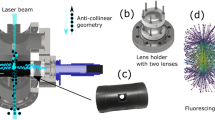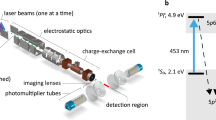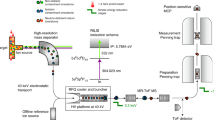Abstract
RECENTLY Schüler and Keyston1 have made some interesting studies on the hyperfine structure of the spectral lines of thallium, from which they conclude that the hyperfine structure is due in part to a relative shift of the spectral terms due to two isotopes of thallium (203 and 205), originating from differences in the structure of the electric field of the atomic nucleus. The isotope splitting is greatest in the terms with relatively small nuclear moment splittings.
This is a preview of subscription content, access via your institution
Access options
Subscribe to this journal
Receive 51 print issues and online access
$199.00 per year
only $3.90 per issue
Buy this article
- Purchase on Springer Link
- Instant access to full article PDF
Prices may be subject to local taxes which are calculated during checkout
Similar content being viewed by others
References
H. Schüler and J. E. Keyston, Die Naturwissenschaften, 19, p. 320; 1931.
S. Mrozowski, Bull. Acad. Pol., p. 464; 1930; in part also NATURE, 126, p. 684; 1930.
S. Mrozowski, Phys. Review, 37, p. 845; 1931.
S. Mrozowski, Zeit. für Physik, 68, p. 278; 1931.
Author information
Authors and Affiliations
Rights and permissions
About this article
Cite this article
MROZOWSKI, S. Isotope Effect and Hyperfine Structure of the Mercury Resonance Line. Nature 127, 890–891 (1931). https://doi.org/10.1038/127890a0
Issue Date:
DOI: https://doi.org/10.1038/127890a0
This article is cited by
-
�ber die Bestimmung der Kernmomente und die Deutung der Hyperfeinstrukturen des Quecksilbers
Die Naturwissenschaften (1931)
Comments
By submitting a comment you agree to abide by our Terms and Community Guidelines. If you find something abusive or that does not comply with our terms or guidelines please flag it as inappropriate.



